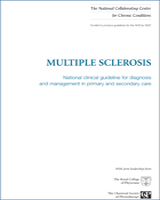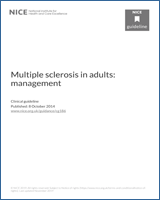NCBI Bookshelf. A service of the National Library of Medicine, National Institutes of Health.
National Collaborating Centre for Chronic Conditions (UK). Multiple Sclerosis: National Clinical Guideline for Diagnosis and Management in Primary and Secondary Care. London: Royal College of Physicians (UK); 2004. (NICE Clinical Guidelines, No. 8.)
This publication is provided for historical reference only and the information may be out of date.

Multiple Sclerosis: National Clinical Guideline for Diagnosis and Management in Primary and Secondary Care.
Show detailsTable 7Suggested measures for auditing MS services in the NHS
| Key priority for implementation | Criterion (data items needed) | Exceptions (interpreting the data) | Definitions (and other comments) |
|---|---|---|---|
| 1. Specialist neurological and neurological rehabilitation services should be available to every person with MS, when they need them. This is usually when they develop any new symptom, sign, limitation on activities or other problem, or when their circumstances change. | The presence (or not) of a specific contract between the health commissioning organisation (primary care trust or local health board) and:
| There are no exceptions. These data are not currently collected, and there are no data to predict a likely caseload and so initial data will be to establish a baseline that could be compared with known epidemiological figures on incidence and prevalence. The neurology rate of seeing confirmed cases is likely to be higher where neurorehabilitation services are limited. The effects on other services of the regular monitoring of patients in the risk-sharing scheme are unpredictable. | The neurology contract may be split to cover the specific work associated with the risk-sharing scheme, and the remaining work. |
| 2. An individual who is suspected of having multiple sclerosis should be referred to a specialist neurology service and be seen rapidly within an audited time. The individual should be seen again after all investigations necessary to confirm or refute the diagnosis have been completed (also rapidly* within an audited time). | The time in weeks
| There are no exceptions. These data are not currently collected, and so initial data will be needed to establish a baseline that could be compared to other timescales suggested in other conditions. Any standard set should recognise that:
| Some people will be diagnosed as definitely having MS, a small number will be diagnosed as definitely having some other condition (eg stroke), a large number will not achieve a diagnosis of any alternative condition and the majority of these will be experiencing somatisation (symptoms associated with no known disease, possibly related to emotional dysfunction). |
| 3. Every health commissioning organisation should ensure that all organisations in a local health area agree and publish protocols for sharing and transferring responsibility for and information about people with MS, so as to make the service seamless from the individual’s perspective. | The presence (or not) of agreed protocols for identifying and sharing responsibility
The number of onward referrals made by services after initial contact before making contact with the final effective service. | There are no exceptions. These data are not currently collected, and so initial data will be needed to establish a baseline. have a protocol. Any standards set should:
| The presence or absence of protocols should be easily established, but it will be difficult to agree what protocols should exist as it would be unrealistic for every eventuality to Protocols could be given to every person with MS on making contact with the service to help them help themselves. It will be difficult to agree when the person has reached the final service. However, a method of people with MS collecting these data has been used and found to be effective, and so this is an achievable process. |
| 4. All services and service personnel within the health care sector should recognise and respond to the varying and unique needs and expectations of each person with MS. The person with MS should be involved actively in all decisions and actions. | The number of complaints made to each service organisation that might reflect a failure to be responsive and to involve the person with MS actively. | There are no exceptions. These data are not currently collected, either specifically in relation to people with MS or specifically in relation to a service being responsive and patient-centred. It may not be appropriate to set a standard, and current NHS policies on complaints and the improvement of services should use the data. | As this standard should apply to all people making contact with NHS services (and other statutory services), it may not be necessary to separate out people with MS. A patient-centred audit of services would be able to monitor this without involving formal complaints. |
| 5. Health service professionals in regular contact with people with MS should consider in a systematic way whether the person with MS has a ‘hidden’ problem contributing to their clinical situation, such as fatigue, depression, cognitive impairment, impaired sexual function or reduced bladder control. | No data can realistically be collected on a routine basis. However, many specialist services may wish to develop and use a formal structured assessment protocol (centres participating in the risk-sharing scheme will do so) and for these services the data to collect would be:
| These data are not currently collected by any service, and so initial data will be needed to establish a baseline for any service doing this. The data should only refer to an agreed initial ‘screening’ assessment aimed to detect major problems needing further attention An episode is a series of ongoing attendances, all of which concern a specified programme of care, and does not include monitoring visits. | Any specialist service that decides to use a formal structured approach to assessment should monitor its use. |
| 6. Every person with MS who has been seen by a specialist neurological or neurological rehabilitation service should be informed how to make contact with the service when no longer under regular treatment or review. The individual should be given guidance on when such contact is appropriate. | The presence (or not) of a formal procedure for responding to self-referral by someone with MS in the:
| There are no exceptions. These data are not currently collected, and so initial data will be needed to establish a baseline. It is important to recognise that ‘initial clinical contact by the service’ is:
| Often the response needed may be no more than reassurance or the provision of information. Some – perhaps many – centres already offer this level of service but probably in an intermittent and variable way. |
7. The commissioning health organisation should require all health care services including community services:
| Presence (or not) in all health service organisations of a procedure to identify and report every new (and existing) pressure ulcer. Presentation of reports on each pressure ulcer identified in a person with MS. Count of a) new and b) prevalent pressure ulcers in people with MS. Presentation of an action plan derived from the report. | There are no exceptions. Data on pressure ulcers are not currently collected in relation to people with MS, and so initial data will be needed to establish a baseline. Ideally none should occur, but in reality some will occur. Not every pressure ulcer represents a direct failure of the health care system. Some will reflect failures in other organisations (for example, social services), others will reflect the choices of the person with MS and a few may be ‘inevitable’. | Properly executed, this audit could save huge resources but it requires continued vigilance by all staff to detect and report pressure ulcers, which will be inhibited by any suggestion that the inquiry will attribute blame to any individual or organisation. Pressure ulcers may be first recorded or detected in one organisation that was not responsible for the person at the time of occurrence, but once detected a full investigation should still be initiated. |
- *
The Guideline Development Group debated the meaning of the word ‘rapidly’. In this context, it is taken to mean that the exact time will vary according to clinical need but should, in the opinion of the development group, be no more than six weeks from referral to being seen by a neurologist, and a further six weeks until any necessary investigations are completed.
- Monitoring quality: audit and governance - Multiple SclerosisMonitoring quality: audit and governance - Multiple Sclerosis
Your browsing activity is empty.
Activity recording is turned off.
See more...
